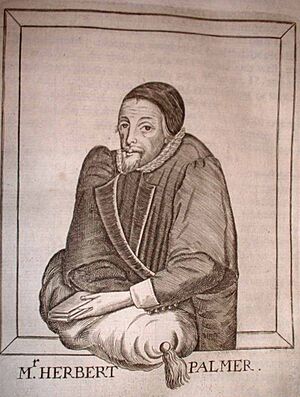Herbert Palmer (Puritan) facts for kids
Herbert Palmer (born 1601, died 1647) was an English clergyman who followed the Puritan faith. He was an important member of the Westminster Assembly, a group that helped shape religious practices in England. He also served as the President of Queens' College, Cambridge. Today, he is best known for his work on the Westminster Shorter Catechism, which is a famous set of questions and answers about Christian beliefs. He was also a strong opponent of John Milton's ideas about divorce.
Contents
Early Life and Education
Herbert Palmer was born in Wingham, Kent, in 1601. His father was Sir Thomas Palmer. Herbert learned French very early, almost at the same time as English, and he could always speak it very well.
In 1616, he started studying at St. John's College, Cambridge. He earned his first degree in 1619 and a master's degree in 1622. In 1623, he became a fellow at Queens' College, Cambridge. He became a clergyman in 1624.
In 1626, he preached a sermon at Canterbury Cathedral. People were very impressed, and he soon became a lecturer at St. Alphage's in Canterbury. He often gave spiritual advice and visited many people, even though he didn't have a regular church job yet. He sometimes preached to the French-speaking community too.
Religious and Political Work
Herbert Palmer was a Puritan, meaning he wanted to "purify" the Church of England from practices he thought were too Catholic. He disagreed with some new rules favored by William Laud, who was a powerful archbishop. Because of his Puritan beliefs, he faced some challenges, but he was not stopped.
Around 1630, his lectureship was temporarily closed because he was teaching too much and attracting people from other areas. However, his friends helped him get it reopened.
In 1632, Palmer became the rector (the main priest) of Ashwell, Hertfordshire. Even Archbishop Laud, who often disagreed with Puritans, helped him get this job. At Ashwell, Palmer developed a special way of teaching the catechism, which is a set of religious instructions. He would give prizes like Bibles to those who learned well. He was considered one of the best catechists in England. He also refused to read the Book of Sports, which allowed certain activities on Sundays that Puritans thought were wrong.
Role in the Westminster Assembly
In 1643, Herbert Palmer was chosen to be a member of the Westminster Assembly. This was a very important group of religious leaders who met in London to reorganize the Church of England. He moved to London and left his church in Ashwell to his half-brother.
Palmer preached to the House of Commons and became a preacher at several churches in London, including Westminster Abbey. In 1644, he was appointed Master of Queens' College, Cambridge. He was a strict leader and helped students who were refugees from other countries. He also donated books to the college library.
In the Westminster Assembly, Palmer played a big part in creating the 'directory' for church services. His most important contribution was to the Shorter Catechism. He helped make sure that each answer in the catechism was a complete statement on its own, which made it easier to learn.
Herbert Palmer died in 1647. He was known for being a small, "crooked man" but was highly respected. He left money to help poor students at Queens' College.
Published Works
Herbert Palmer is often credited with writing a book called The Characters of a believing Christian, in Paradoxes and seeming Contradictions, which was published in 1645. This book was once thought to have been written by Francis Bacon. He also wrote a book about keeping Sunday holy with Daniel Cawdry.
- Lord Bacon not the author of "The Christian paradoxes
- [1]
- [2] OL 6621071M LCC BV4500 .P3 1865
- [3] OL 7169599M
- [4] OL 7044907M LCC BV4500 .P3 1864
- (1865) [5] OL 7237141M


